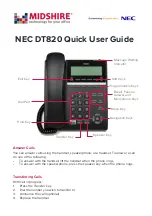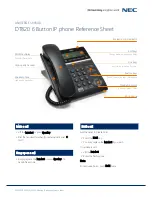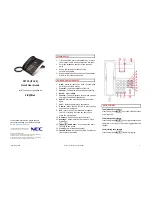
1-11
Cisco MGCP IP Phone Administrator Guide, Release 6.x and 7.x
Chapter 1 Product Overview
Where to Go Next
Where to Go Next
•
See
Chapter 2, “Installing Cisco IP 7960G/7940G Phone Hardware on the Desktop or Wall,”
for
placement of the phone on the desktop or wall and for cabling information.
•
See
Chapter 3, “Initializing Cisco MGCP IP Phones,”
for installation of the firmware and
connecting the phone to power sources and the network.
•
See
Chapter 4, “Managing Cisco MGCP IP Phones,”
for upgrading firmware and performing other
management tasks.
•
See
Chapter 5, “Monitoring Cisco MGCP IP Phones,”
for information on debugging and on viewing
network statistics.
TCP
Transmission Control Protocol. Provides a reliable byte-stream transfer
service between endpoints on the Internet. The Cisco MGCP IP phone uses
TCP for Telnet and HTTP sessions.
TFTP
Trivial File Transfer Protocol. Allows files to be transferred from one
computer to another over a network. The Cisco MGCP IP phone uses TFTP
to download configuration files and software updates.
ToS
Type of service. An indication of how an upper-layer protocol requires a
lower-layer protocol to treat its messages. In SNA subarea routing, ToS
definitions are used by subarea nodes to determine the optimal route to
establish a given session. A ToS definition comprises a virtual route number
and a transmission priority field. Also called class of service (CoS).
UDP
User Datagram Protocol. Exchanges data packets without acknowledgments
or guaranteed delivery. An MGCP network can use UDP as the underlying
transport protocol. If UDP is used, retransmissions are used to ensure
reliability.
VAD
Voice activity detection. When enabled on a voice port or a dial peer, silence
is not transmitted over the network, only audible speech. Sound quality is
slightly degraded, but the connection monopolizes much less bandwidth.
Table 1-2
Supported Protocols (continued)
Protocol
Description






























